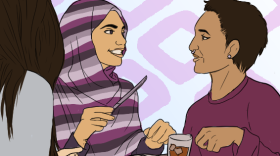
Yasmin Bendaas
Host, Me & My Muslim FriendsYasmin Bendaas grew up in Winston-Salem, North Carolina in an Iranian-Algerian household, which was less confusing than it could have been. She studied anthropology at Wake Forest University and science & medical journalism at UNC Chapel Hill. The most meaningful work she’s completed has been in Algeria with reporting for AlJazeera, Reuters and the Pulitzer Center. Breaking from straight news, Yasmin now works at ICON as a proposal writer for global clinical trials. She couldn’t have made this podcast without the contributions of the people listed here. You can follow her @yasminbendaas.
-
Religion and sexuality are often pitted against one another...so where does that leave folks who seek attunement and education for both?
-
When the U.S. pulled out of Afghanistan, ending a 20-year war, the abrupt departure of troops triggered a refugee crisis, with more than 76,000 Afghan refugees arriving in the U.S. afterward. Host Yasmin Bendaas meets Mangal Mohmand, who arrived as a refugee from Afghanistan 8 years ago, for more insights on the refugee experience and the process of resettling a family in America. She also speaks with Asma Khan, president of the Triangle Association of Muslim American Mothers (TAMAM), about the nonprofit’s charitable work which includes refugee resettlement.
-
Anisa Khalifa, a producer on the Me & My Muslim Friends team, also hosts her own podcast called Muslim in Plain Sight. The show focuses on coming of age post-9/11 and how the Muslim community became both “invisible and hypervisible.” In this bonus episode, Khalifa and co-host Khadija Khalil talk to Joshua Salaam, Muslim Chaplain at Duke University, about being Muslim in the military, anti-Black racism in our communities, and Salaam’s musical and professional career.
-
Palestinian American guests Samia and Abdullah have navigated a politicized identity their whole lives. They join host Yasmin Bendaas to discuss their eye-opening experiences visiting the Palestinian territories, how they’ve maintained their culture and identities growing up in the U.S., and their hopes for lasting peace.
-
Guests Nigel Edwards and Amath Diouf join us for reflection on the protests for Black lives in 2020 and how many Black Muslims were finally hearing Friday sermons challenging anti-Blackness. While Black Muslims make up at least 1 in 5 Muslims in America, we often don’t talk about the racism they face both outside and inside our community. In this episode, Nigel and Amath share experiences of what anti-Blackness looks and sounds like—even among fellow Muslims—and what they wish more non-Black Muslims understood.
-
In Season 2, we’re talking about how social justice intersects with our faith. Catch up on our already-released episodes, and preview forthcoming conversations on racism faced by Black Muslims and the occupation of Palestine.
-
In this continuation of a conversation from the last episode, host Yasmin Bendaas explores the challenges of being a Muslim woman in today's political landscape with Durham County Commissioner Nida Allam and grassroots organizer Leila Ali of Muslim Women For. They discuss how their activism is influenced by their faith, the burden of representing the entirety of the Muslim community, and what their message is for young Muslims who also want to step into politics.
-
Nida Allam and Lela Ali are two trailblazing Muslim women in politics. Allam is the first Muslim woman elected to office in North Carolina as Durham County Commissioner, and she recently announced her bid for Congress (no big deal). Ali is Policy and Program Director at Muslim Women For, nurturing vibrant Muslim communities through grassroots organizing. In this episode, the first of a two-part conversation, Yasmin asks both guests about their motivations for entering politics and the challenges they face, including Islamophobia.
-
Today on Tested, we introduce to our listeners the fantastic new podcast from ����app: Me & My Muslim Friends
-
In the Season 2 debut, guests Abdullah Dorgham and Ahmed Amer bond with host Yasmin Bendaas over a shared confusion that comes when asked to fill out their race on forms.


